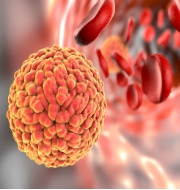New TB-resistant cows developed in China
Chinese scientists from Northwest A&F University have produced world’s first live cows with increased resistance to bovine tuberculosis (TB).
This development shows that genetic modification technology can be better suited to producing transgenic livestock with purposefully manipulated genetic.
Key Facts
- Researchers had used a modified version of the CRISPR gene-editing technology called CRISPR/Cas9n to insert a new TB resistance gene NRAMP1 into the genome of bovine foetal fibroblasts, cell derived from female dairy cows.
- These cells were then used as donor cells in a process called somatic cell nuclear transfer. In it, nucleus of a donor cell carrying the new gene was inserted into an egg cell, known as an ovum, from a female cow.
- These ovum were then nurtured in the lab into embryos and transferred into mother cows for a normal pregnancy cycle.
- During this cycle, cows were produced with no off target effects on the animals’ genetics — a common problem when creating transgenic animals using CRISPR.
Significance
- This scientific process revealed that NRAMP1 had successfully integrated into the genetic code at the targeted region in all of the calves.
- When it was exposed to Mycobacterium bovis (M. bovis), bacterium that causes bovine TB, transgenic animals showed increased resistance to M. bovis.
- Further in laboratory tests, the white blood cells taken from the calves also showed much resistance to M. bovis exposure.
What is CRISPR-Cas9 gene-editing technique?
- CRISPR short form of clustered regularly interspaced short palindromic repeats. It allows scientists to selectively edit genome parts and replace them with new DNA stretches.
- Cas9 is an enzyme that can edit DNA, allowing the alteration of genetic patterns by genome modification. CRISPR is a collection of DNA sequences that direct Cas9 where to cut and paste.
- CRISPR-Cas9 technology has the potential to revolutionise the treatment of blood diseases, tumours and other genetic diseases.
Month: Current Affairs - February, 2017


